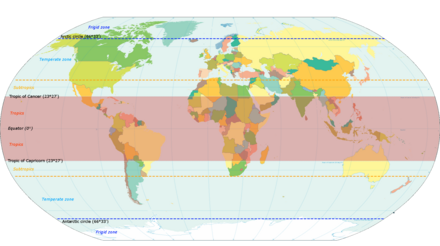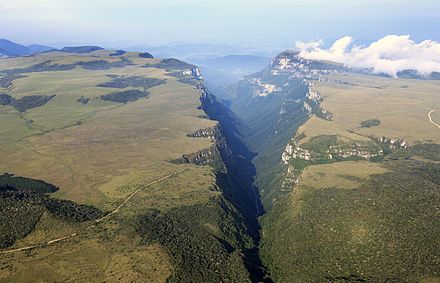Subtropical rainforests
Subtropical rainforests
Subtropical rainforests are rainforests that share characteristics of both tropical rainforests and temperate forests.
Understand

The tropics extend from approximately 20 degrees north to 20 degrees south, including the tropical rainforest biome encountered in Equatorial parts of the Malay Archipelago, Africa, and the Amazon. At the borderline between the tropics and the temperate climates are tropical savanna, desert, and subtropical rainforest climates.
Subtropical rainforests are found on the east coasts of North America and Asia, in addition to some mountainous semi-tropical regions and parts of Oceania. The regions in which they exist have hot summers with abundant rainfall, similar to the year-round climate of a tropical rainforest, but which transition in winter to colder temperate climates with moderate rainfall.
Subtropical rainforests have a lot in common with tropical rainforests, and in places like Florida, a state in the United States where subtropical rainforests dominate, you can find palm trees; however, as you go north from Florida into the state of Georgia, the plants start to look more like what you would find in a temperate forest. However, the density of subtropical rainforests and tropical forests mark them out; in temperate forests, most of the vegetation is in the form of trees, and there is not thick vegetation along the ground level. Meanwhile, subtropical forests tend to have thick vegetation that extends to a couple feet above the ground, making navigation through the forest difficult.
These forests are not to be confused with the temperate rainforests encountered on the West Coast of the United States, which feature mild summers and cool to cold winters, with precipitation significantly higher in winter than in summer.
Destinations
Subtropical forests can be found around the edges of the tropics; they can be found in the Southern United States, South and parts of Southeast of Brazil, Northern Argentina (Tucumán),New South Wales, South East Queensland, Mexico, Southeast Asia, and India.
New South Wales and SE Queensland
 For most first-time bushwalkers in Australia, and are visiting New South Wales (that is by the coast and north of the ACT) or South East Queensland, most bushwalks pass through subtropical rainforests. The prime patches of subtropical rainforests are in the north, in the UNESCO World Heritage listed Gondwana Rainforests of Australia, containing extensive pieces and patches of subtropical rainforests from the times of Gondwana, which stretch from the Scenic Rim in Qld, down south to Barrington Tops National Park in the Hunter region.
For most first-time bushwalkers in Australia, and are visiting New South Wales (that is by the coast and north of the ACT) or South East Queensland, most bushwalks pass through subtropical rainforests. The prime patches of subtropical rainforests are in the north, in the UNESCO World Heritage listed Gondwana Rainforests of Australia, containing extensive pieces and patches of subtropical rainforests from the times of Gondwana, which stretch from the Scenic Rim in Qld, down south to Barrington Tops National Park in the Hunter region.
East Asia
Southern China has subtropical forest/rainforest in Guangdong, Guangxi, Yunnan, Hunan, and Fujian provinces, primarily, as well as on the island of Hainan. On Hainan the forest type transitions into tropical. In far southern Yunnan, tropical rainforests start to predominate, near the border with Myanmar/Vietnam.
India
Mexico
Southern United States

The Southern United States is often associated with plantations and, for this reason, "the South" can easily imply farming land rather than dense forest. However, a visit to the South will prove otherwise; with the exception of rivers and the areas immediately surrounding them, thick forest is found throughout much of the South, particularly in the southern parts like Florida and Georgia. Subtropical forests predominate in the south, and encompass such types as mangrove forest, Subtropical pine forest and palm savannas, and Subtropical montane forest, such as those found in the southern Appalachians. Subtropical forests/rainforests predominate, and become significant, in the states of South Carolina, Georgia, Florida, Alabama, Mississippi, Louisiana, and Texas, giving way to a variety of different Tropical rainforest and forest types found in southern Florida, far south Texas, and on the island of Hawaii.
The forests in this region of the world usually contain a significant amount of blackwater rivers and wet grassland, often called swamp.
South and Southeast of Brazil
 Subtropical forests can be found in the region called Mata Atlântica, in the states of Rio de Janeiro, São Paulo, Paraná, Santa Catarina and Rio Grande do Sul.
Subtropical forests can be found in the region called Mata Atlântica, in the states of Rio de Janeiro, São Paulo, Paraná, Santa Catarina and Rio Grande do Sul.
Get around
On foot
Similar to tropical rainforests, getting around on foot is not easy in subtropical rainforests. As mentioned above and shown at the edges of the picture to the right, thick vegetation dominates in subtropical rainforests and means that getting through it is not always easy.
In places like Florida, there are hiking trails that solve this problem, but still have to deal with mosquitoes during the warmest parts of the year. While mosquitoes are not so bad in cities and on the shoreline of subtropical regions, as soon as you get into the subtropical rainforests themselves, you can encounter large numbers of mosquitoes, including around waterways.
By car
In areas with decent road networks, getting around by car is a good way to see subtropical rainforests without having to actually be inside them, especially if there is a clearing on each side of the road.
Stay healthy
In summer, especially, you'll need to watch out for mosquitoes if you decide to hike through the rainforest. Even if you're driving through the subtropical rainforest, a few seconds with the doors open while you get inside the vehicle is enough time for mosquitoes to get in the vehicle with you.